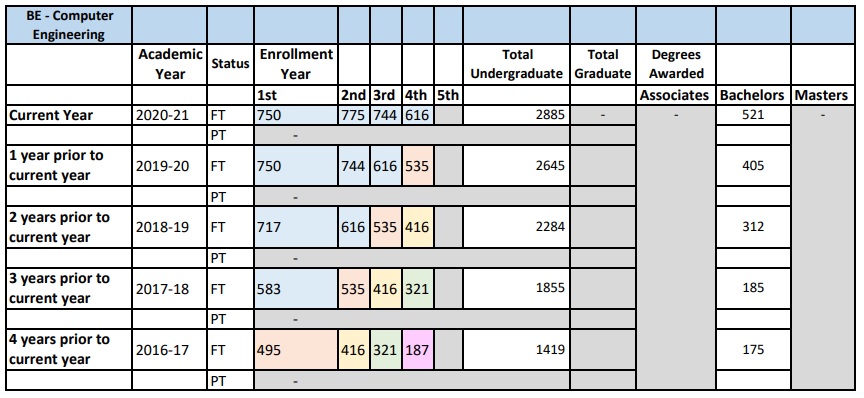ABET accreditation
ABET accreditation
The Computer Science and Engineering is accredited by the Engineering Accreditation Commission of ABET, https://www.abet.org
Click here for more information
About ABET
ABET, incorporated as the Accreditation Board for Engineering and Technology, Inc., is a non-governmental organization that accredits post-secondary education programs in "applied science, computing, engineering, and engineering technology". The accreditation of these programs occurs mainly in the United States but also internationally. ABET accreditation is assurance that a college or university program meets the quality standards established by the profession for which it prepares its students. ABET promote excellence in technical education by focusing on continuous quality improvement processes, not by prescribing methods. With technological change occurring so rapidly, institutions seeking to ensure their programs are dynamically evolving participate in the ABET accreditation process.
ABET accreditation:
- Verifies that an educational experience meets the global standard for technical education in a profession.
- Enhances the employment opportunities—multinational corporations require graduation from an accredited program.
- Supports the entry to a technical profession through licensure, registration, and certification—all of which often require graduation from an ABET-accredited program as a minimum qualification.
- Establishes the eligibility for many federal student loans, grants, and/or scholarships.
- Paves the way to work globally, because ABET accreditation is recognized worldwide through international agreements, and many other countries’ national accrediting systems are based on the ABET model.
Program Educational Objectives
- Demonstrate technical expertise to provide solutions for challenging problems by applying computer engineering theory and principles.
- Engage in life-long learning and professional development to adapt to rapidly changing field of computer engineering.
- Achieve leadership roles in their profession by inculcating professional ethics and code of professional practices
Student Outcomes
1.an ability to identify, formulate, and solve complex engineering problems by applying principles of engineering, science, and mathematics.
- Ability to identify and formulate problems related to computational domain.
- Apply engineering, science, and mathematics body of knowledge to obtain analytical, numerical, and statistical solutions to solve engineering problems.
2. an ability to apply engineering design to produce solutions that meet specified needs with consideration of public health, safety, and welfare, as well as global, cultural, social, environmental, and economic factors.
- Design computing system(s) to address needs in different problem domains and build prototypes, simulations, proof of concepts, wherever necessary, that meet design and implementation specifications.
- Ability to analyze the economic tradeoffs in computing systems.
- Able to evaluate ethical issues that may occur in professional practice using professional codes of ethics ensuring protection of organization, human safety and wellbeing of society.
3. an ability to communicate effectively with a range of audiences.
- Prepare and present variety of documents such as project or laboratory reports according to computing standards and protocols.
- Able to deliver oral presentations to pitch ideas for projects, research and/or startups.
- Able to communicate effectively with peers in well organized and logical manner using adequate technical knowledge to solve computational domain problems and issues.
- Able to interact with the people in organizations, industries and/or professional societies in a professional manner to achieve desired goals.
4. an ability to recognize ethical and professional responsibilities in engineering situations and make informed judgments, which must consider the impact of engineering solutions in global, economic, environmental, and societal contexts.
- Aware of ethical and professional responsibilities while designing and implementing computing solutions and innovations.
- Recognize the impact of designed and implemented computational solutions on energy resource utilization and other environmental factors.
- Evaluate computational engineering solutions considering environmental, societal, and economic contexts.
5. an ability to function effectively on a team whose members together provide leadership, create a collaborative and inclusive environment, establish goals, plan tasks, and meet objectives.
- Participate in the development and selection of ideas to meet established objective and goals.
- Able to plan, share and execute task responsibilities to function effectively by creating collaborative and inclusive environment in a team.
6. an ability to develop and conduct appropriate experimentation, analyze and interpret data, and use engineering judgment to draw conclusions.
- Ability to perform experimentations and further analyze the obtained results.
- Ability to analyze and interpret data, make necessary judgement(s) and draw conclusion(s).
7. an ability to acquire and apply new knowledge as needed, using appropriate learning strategies.
- Able to explore and utilize resources to enhance self-learning.
- Ability to identify directions for continuing education opportunities.
- Recognize the need to embrace personal responsibility for lifelong learning.
Program Enrollment and Degree Data
